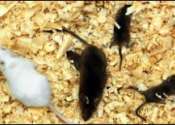Chromosome 'anchors' organize DNA during cell division
For humans to grow and to replace and heal damaged tissues, the body's cells must continually reproduce, a process known as "cell division," by which one cell becomes two, two become four, and so on. A key question of biomedical ...








